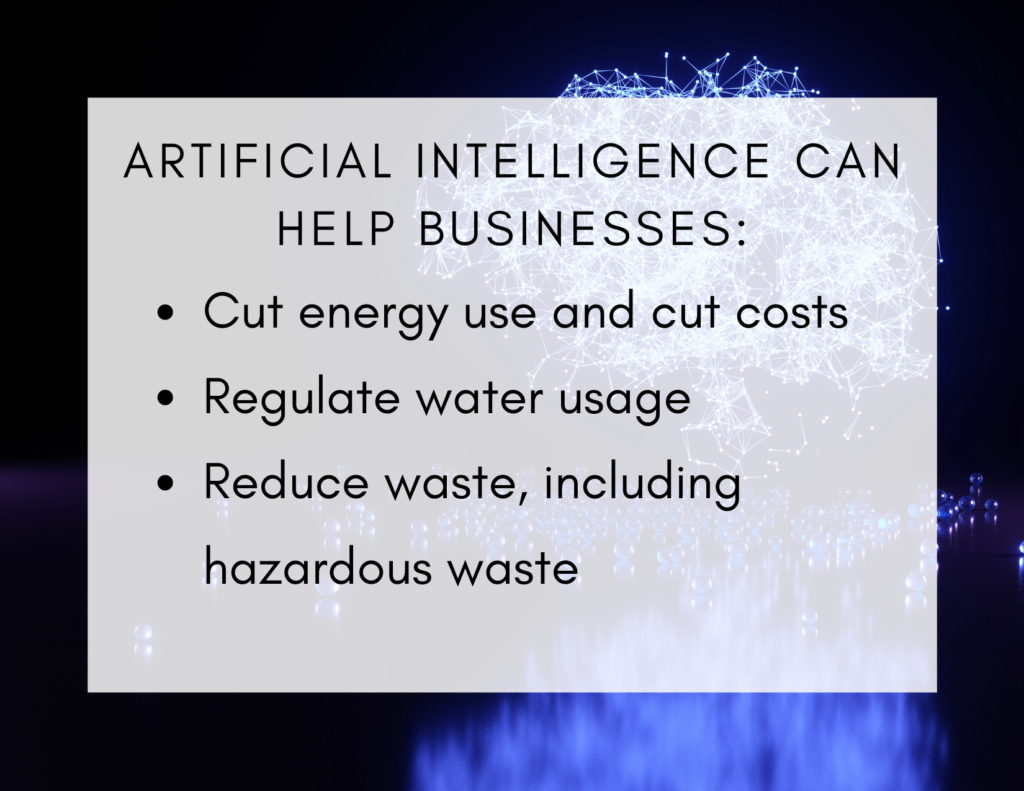Around the world, sustainability has made its way to the forefront of everyone’s mind, including businesses. As governments and consumers push companies to improve their sustainability efforts, it can be challenging to keep up with the demand of the oftentimes expensive changes that sustainability requires.
Luckily, advances in artificial intelligence, or AI, are helping businesses monitor and improve their facilities to not only improve environmental consciousness, but save money while doing so.
This article examines how advances in AI help businesses assess and improve their sustainability through energy consumption, waste management, and water usage.
The Business Of Sustainability
Businesses are among the leading causes of climate change worldwide, with energy and resource consumption, industrial waste, and long-distance shipping accounting for approximately 80% of all global greenhouse gas emissions. While individuals work to curb their climate contributions, it’s imperative for businesses to do the same.
Not only do sustainability efforts reduce a company’s environmental impact, but when done well, they can improve business models. As threats of climate change increase, a growing number of consumers are looking for businesses that actively support environmental efforts.
As well as improving competition with unsustainable companies, sustainability efforts drastically reduce costs of business operations. With the help of environmentally-focused AI, businesses can implement effective, long-term changes to their business to improve environmental sustainability.
AI Leading the Way
AI programs have a broad range of applications and can be incorporated into nearly every faction of business operations. Companies can significantly reduce their environmental impacts by monitoring and facilitating energy consumption, waste, and water usage.

Energy Reduction
Many businesses, regardless of product or service, use high amounts of energy to run their operations. Major corporations, like Google and Microsoft, have recently implemented AI to assess and alter the energy consumption of their data servers. AI programs developed for minimized energy usage learn how to appropriately cool data centers without constant human management or human error, resulting in a 40% decrease in energy consumption.
Similar machine learning has been incorporated into smaller businesses as well, with companies using AI to heat, cool, and manage energy usage in office buildings and factories. This effectively minimizes energy consumption without the need of manual controls.
Companies that handle electronics, either through production and distribution or those that use them in their products and services, can utilize international standards, machine learning, and assessments that ensure safe practices and energy efficiency, such as Energy Star certification, the CB procedure, RoHS audits or Electrical Safety audits. By implementing these kinds of assessments and machine-based management systems, companies can save money and energy in the long-term, with relatively small initial investments.
Saving Water
Similarly, many businesses have begun using AI to reduce water consumption. Studies have found that buildings can waste up to 30% of water consumed, typically through small leaks that go unnoticed. AI systems have been developed to detect and report these leakages, and as a result have been able to minimize water consumption and water damage in buildings.
In 2018, the Atlantis Casino Resort installed a WINT water monitoring AI system to regulate their water usage, which averaged 6.5 million gallons per month. One year after an initial investment of $48,000 to install the program, the company saved $36,000 in water reduction alone. WINT’s AI software reports leaks and malfunctions in piping that would otherwise be undetectable, and automatically turns off water supplies in cases of abnormalities. In doing so, the resort has reduced water waste by an estimated 25%, and has prevented thousands of dollars in potential water damage.
Minimized Waste
AI has also helped reduce waste. Industrial waste is estimated to make up approximately 50% of total global waste, largely as a result of imperfect manufacturing processes and over-production. By incorporating advanced machine learning systems into production processes, AI can tell manufacturers what to produce and when, and accurately give estimates for quantities needed.
For industrial processes that create high amounts of hazardous material, AI assistance can lead to significantly less hazardous waste sent to landfills, which can be expensive and highly toxic to the environment. Industrial pollution takes a heavy toll on the planet when not disposed of correctly, with toxic air emissions, contaminated waters, and hazardous substances threatening human health and the environment. AI can help not only to reduce waste by ensuring proper quantities are used, but can help to sort hazardous waste in order to properly dispose of it. For example, one of the major types of hazardous waste comes from electronics, which often contain dangerous heavy metals that harm human health and the environment. AI robots from the Danish Technological Institute are being trained to sort this hazardous waste, leading to proper disposal, which reduces the amount of chemical leaching from landfills, and lowered human exposure to hazardous materials.
These practices extend beyond industrial production and apply to smaller-scale businesses as well. Food producers like chefs, bakers, and other suppliers that use AI technology have reported reductions of up to 20% in forecast errors and 30% reductions in lost sales. This leads to significantly less food waste, which drastically reduces greenhouse gas emissions from landfills and unnecessary resource consumption. For example, IKEA partnered with AI tool Winnow Vision to reduce food waste in their kitchens. Winnow Vision has been installed in 23 IKEA stores, which has helped to reduce food waste by 50%, representing a huge sustainability success.
AI technology is rapidly growing, giving businesses new insight to production, waste, and overall business practices. By applying these new technologies, businesses can significantly reduce their environmental impacts and make their businesses run smoother and greener.
The post Environmental Intelligence: How AI Helps Businesses Save Money and Save the Planet first appeared on U.S. Green Chamber of Commerce.
